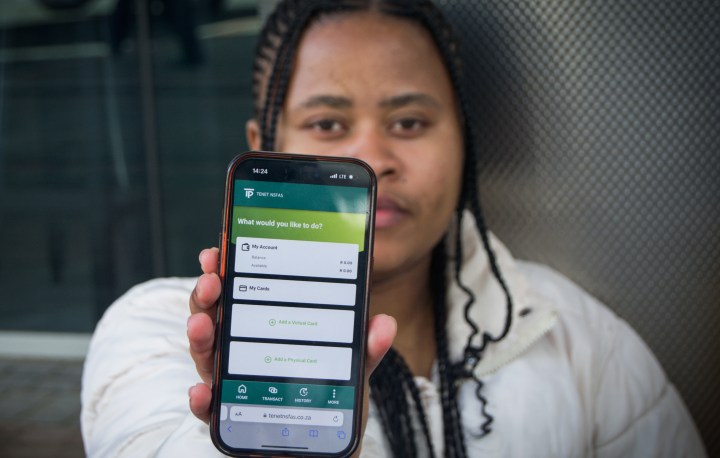CAMPUS BLUES
‘Uncertainty, anxiety and frustration’ — NSFAS students cry foul over new banking system

Frustration is brewing in the university sector following the implementation of a new banking system for NSFAS-funded students in the middle of the academic year. The new banking system will charge students more in bank fees than commercial banks do.
Students funded by the National Student Financial Aid Scheme (NSFAS) have raised concerns about a new direct banking system implemented by the scheme, with some questioning communication around the new system, high banking service costs and why it was implemented in the middle of the academic year.
On its website, NSFAS said its new “Bank Account” system was devised to cater for the ever-increasing number of students it funds. This year alone more than one million students are funded through the aid scheme.
The new system was introduced to ensure that funded students receive their allowances for food, transportation and other living expenses in a secure and seamless way. Previously, NSFAS distributed funds for students to universities, and the money would then be distributed to NSFAS students.
While the NSFAS Bank Account started in 2022 for students at Technical and Vocational Education and Training (TVET) colleges, it was only recently implemented for university students.
‘It’s a scam’
Over the past week, Daily Maverick received several messages from students about this system, including concerns over the fact that allowances had not been paid, while there was still confusion about how the system would work.
Daily Maverick visited the NSFAS offices in Cape Town’s Foreshore where students sought help with the system. Staff were tight-lipped and advised students to exercise patience.
Masibulele Siqingatha, a 21-year-old first-year marketing student at the Cape Peninsula University of Technology (CPUT), said he had received his allowance “without any issues” until the new banking system came into effect. Now Siqingatha is being reviewed for funding eligibility.
“It’s strange to think that I am being reviewed for NSFAS funding eligibility now after already receiving it for half a year,” Siqingatha said.

Students Nasiphi Mqulwana, Inam Nkomentaba and Esethu Mtanga outside the NSFAS Building at 4 Christiaan Barnard Street, Cape Town. (Photo: Ziyanda Duba)
When he was at the NSFAS office, Siqingatha said he had been told to wait for communication from Tenet Technology, one of four companies involved in the new banking system. However, Siqingatha said Tenet Technology had not yet provided a timeframe for responding to his questions.
Another CPUT student, Anesipho Moyake, told Daily Maverick that she did not initially have a problem with the new system.
“But now I’m still expecting my funds for July. It hasn’t even reflected in that Tenet bank account. I think this thing is a scam,” she said.
Unanswered questions
Daily Maverick sent questions to NSFAS about the new system over the course of two days, but they had not responded by the stipulated deadline. Questions to Higher Education, Science and Technology Minister Blade Nzimande were referred to NSFAS.
On Wednesday afternoon, Nzimande, via his Twitter account, said that in light of the “numerous social media queries” about NSFAS, he had directed NSFAS to clarify all the concerns raised by students. He said NSFAS “was working towards having a media engagement soon” about the issue.
In light of the numerous social media inquiries pertaining to the National Student Financial Aid Scheme (NSFAS), I have directed that the NSFAS Management clarify all the concerns raised by students.
As a result, NSFAS is working towards having a media engagement session soon…
— Minister Blade Nzimande (@DrBladeNzimande) July 5, 2023
Outa steps in
This is not the first time questions have been raised over the new banking system. In February, the Organisation Undoing Tax Abuse (Outa) raised concerns that NSFAS hired businesses without “banking licences or VAT registrations”.
In February, Outa said that four businesses were tasked with the distribution of student funds – Coinvest Africa, Tenet Technology, Norraco Corporation and Ezaga Holdings. Outa claimed that only Ezaga Holdings had a banking licence, despite this being a compulsory bid requirement. In addition, Outa claimed two of the businesses, Norraco and Tenet Technology, were registered as VAT vendors when they submitted their bids.
Outa also said the new bank accounts charged more for payments than student accounts in other commercial banks.
One example of this was charging R29 for a monthly bundle fee for which other banks charged R10. Other examples include charging R12 per R100 for ATM withdrawals while other banks charge R7.50 per R1,000.
According to Outa’s calculations, the NSFAS Bank Account deal could be worth R1.5-billion over the next five years – “just to provide students with access to a NSFAS bank card”.
“This will be paid directly by the students out of their allowances, as the costs are deducted from their bank accounts,” said Outa.
See Outa’s breakdown of the NSFAS account costs versus other banks’ costs here.
Student organisations get involved
Issues around the payments have reached student organisations, with Democratic Alliance Student Organisation (Daso) federal chairperson Lenard Malesa saying the service charges are a major issue.
“Students are being charged R12 monthly fee excluding transaction charges whilst we are experiencing an astronomical rise in the cost of living throughout the country, but Minister Nzimande thinks that it’s logical to loot money from the poorest of the poor and missing middle students utilising his NSFAS agents,” Malesa said.
He questioned why the system was introduced in the middle of the year, “when students are busy with exams. Why not in the beginning of the year?”
Daso said they would reject the payment system until Nzimande and NSFAS provided them with a “tangible and secured system that doesn’t exploit and confuse our students”.
Malesa said Daso would engage with DA MP Chantel King, a member of the parliamentary higher education oversight committee, on the issue.
The Student Representative Council (SRC) of the University of Cape Town sent an email to the student body on Tuesday, 4 July, stating it noted the “uncertainty, anxiety, and frustration” around the new direct payment system.
The SRC rejected the new system and wanted UCT to retain the administration of disbursing student allowances.
The SRC said it noted the “ridiculous and questionable manner” in which Coinvest – the banking business implemented at UCT – administered allowances to students.
“We are aware of the unfounded and outlandish charges of withdrawals and money transfers perpetuated by the Coinvest,” the SRC said.
It said it viewed this as a selfish and opportunistic attempt by the company to “further indulge in state funds that are meant to help the children of the poor working class during the course of furthering their studies, which we reject as UCT SRC”.
The UCT SRC called for Nzimande’s resignation. It claimed NSFAS and the Department of Higher Education had proven they did not have the best interests of students at heart.
On Wednesday, the Economic Freedom Fighters Student Command wrote to Nzimande over a litany of issues in the higher education sector, including the new banking system. They questioned the high banking costs, labelling them “illogical and unreasonably high”.
The EFF Student Command added that every time a student needed to “buy bread, sanitary towels and toiletries they must think twice because the transactional fees are so high”.
They also questioned the use of banking businesses which did not have the required banking licences. The EFF Student Command said students were running out of patience, and if their grievances continued to fall on deaf ears, they would “take to the streets”.
♦️EFFSC LETTER TO MIN BLADE NZIMANDE♦️
“The students of South Africa are beginning to run out of patience, and if our letters keep falling on deaf ears, we will be left with no other choice but to exercise our democratic rights and take them to the streets.”#NSFASCrisis pic.twitter.com/cCM6N9WQpr
— EFF Students’ Command (EFFSC) (@EFFStudents) July 5, 2023
The University of the Witwatersrand’s SRC said its position was that NSFAS and Tenet Technology (which was to be used at the university) were not in any position to initiate the system and should rather focus on integrating NSFAS and the new banking officials into Wits over a period of 20 months before allowances could be taken over.
The primary concern was not with Tenet Technology, but with “the allowance distribution data” that NSFAS will send to Tenet Technology.
“We encourage NSFAS to fix its issues with registration data collection on an accurate level before giving the responsibility of allowance distribution to Tenet,” the SRC said. DM
Disclosure: Daily Maverick intern Jim Mohlala is a third-year CPUT journalism student who is able to complete his studies through funding from NSFAS.




















 Become an Insider
Become an Insider
i really cant believe we actually managed to pass the storm …nsfas new banking system caused a lot of rubs this year.